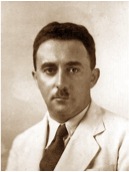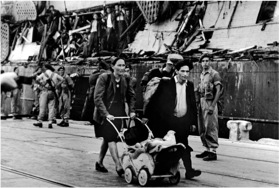Jewish Request at the End of WWII: Let My People Go [to Palestine]!
(13 May 1945)
Source: Palestine Post, May 14, 1945, pp. 1 and 3; See abbreviated version of the speech in Daphne Trevor, Under the White Paper: Some Aspects of British Administration in Palestine from 1939 to 1947, Jerusalem: The Jerusalem Press Ltd, 1948, p. 131.
Printable PDF

…So ran the Palestine Post’s coverage of a key speech in the history of the Yishuv. Shertok proclaimed – as David Ben-Gurion, the head of the Jewish Agency, had said – that Jews were going to control their own destiny. Ben-Gurion had said on numerous occasions that Jews were going to control their own destiny, despite the imposition of the British White Paper in 1939 that restricted Jewish growth in Palestine (he also specifically proclaimed that the Zionists would form a state in his May 1942 Biltmore Hotel speech).
Shertok appealed to leaders in European capitals to let remaining European Jews immigrate to Palestine, adamantly proclaiming that those in Palestine already would press on with the state’s establishment, whether the international community abandoned them at this juncture or not. Shertok’s remarks were followed by a tribute by Dr. Yitzhak Herzog “to Britain’s lone and heroic stand after Dunkirk and to America’s immense contributions to the final victory….” After giving particular thanks to the British soldiers “that stemmed the Nazi drive against the Middle East [in North Africa],” Herzog noted that the great task at hand was the “restoration of the dignity of human life.” [2] Herzog pointed his finger at the nations of the world for failing “to realize the tragedy of the homeless Jewish people.” Herzog concluded that “[no] sophistry could obscure the true meaning of the Balfour Declaration, which meant the restoration of the Jew to the land.” [3] He concluded his remarks by appealing for friendship between Arabs and Jews in the future. The objective (of establishing a Jewish state that would have friendly relations with its Arab neighbors) was consistent with what Shertok and colleagues would offer the head of the Arab League two years later in September 1947. The concept of comity with Arab neighbors would be mentioned again in Israel’s Declaration of Independence in 1948.
At this moment in May, Yishuv leaders put great stock in Britain; it had performed heroically in winning the war with its allies, and now hopes were pinned to British leaders to do the right thing and allow thousands of Jews to immigrate to Palestine. But this favorable attitude towards Britain did not keep Shertok from chiding the English for not having opened the gates of Palestine to Jewish immigration during the war. The most pressing Zionist objective was to rescue displaced persons in Europe; by mid-June 1945, Shertok wrote to British High Commissioner Lord Gort asking for 100,000 immigration certificates. Regrettably, in the same month Shertok had to make preparations for Britain not to acquiesce to the request; the Jewish Agency’s Haganah sent men to Europe to augment the system of illegal immigration to Palestine begun in the late 1930s. The Labour victory in Britain in July brought hope to the Zionists that the White Paper restrictions would be removed; that did not happen. In opposition to the British government, President Truman endorsed the dispatch of 100,000 displaced Jews to Palestine. For the next few years, the issue of giving displaced European Jews immigration certificates to Palestine came to dominate British-American disagreements over Palestine. Ultimately the 100,000 were allowed to immigrate, but not before the future of Palestine was tied up in the emotional aftermath of what happened in Europe between 1939 and 1945.

Sadly, another lesson of recent Jewish history was reinforced for those Jews who wanted to trust ruling politicians: changing politics, unsatisfactory policies, and callous personalities determined the Jewish people’s fate. Britain, so noble in fighting Nazism on the battlefield and enduring the blitz, elected a new Labour government that chose not only to prevent immigration at this desperate moment for Jews remaining in Europe, but also to throw up road blocks in 1947 to the partition of Palestine. The answer to this impasse came screaming in the ears of Zionist leaders: “do it yourself.” The Haganah committed itself to illegal immigration and the Jewish Agency chose to lobby UN members about Palestine’s future. The media focus on what had just happened in Europe and what might happen with displaced European Jewry overshadowed the groundwork laid by the Yishuv; this came to be a significant factor in shaping the narrative of the emergence of the state of Israel. Emotionally wrenching scenes of Jews trying to make it to Palestine against a British blockade and the effects of anti-Jewish policies clouded the previous four decades of Zionist success in building a framework for a state. Further obscured was the role of political decisions made by Palestinian Arabs and other Arab leaders in assisting the Jewish state’s establishment. The historical lens and focus was on immigration; no one spoke of Palestinian Arab complicity in helping the Zionists acquire land and build their state. Events of May-June 1945 significantly changed the memory and thus the historiography of how the emerging conflict would be viewed for decades to come. Shertok made it clear in his speech: despite all the setbacks, the Jews were going to establish a state. Jews were going to be the masters of their fate.
–Ken Stein, June 2012
“In view of the staggering proportions of our catastrophe, let us not belittle the miracle of our deliverance. The designs of the enemy to make the world ‘Judenrein’ (‘Jew-clean’) stand defeated. Let us remember the countries which stood on the brink of the precipice —one such country was England, another was Palestine. Time after time we were threatened. Let us never forget the days of El Alamein when the beginnings of our achievements and the hope of generations of Jewish people wavered between life and death and the Yishuv of 600,000 souls were confronted by the abyss of oblivion
“Is there any other people throughout the world which draws up such a balance sheet or tasted the bitter fare of death as we did? Others were menaced by conquest and enslavement; in our case alone an entire people seemed destined to perish. At a time when other peoples count their battle casualties in hundreds of thousands; we count millions slaughtered as sheep. Against the background of this overwhelming demonstration of shame and dishonor of our weakness, every manifestation of strength and valor in Jewry, the memory of every death in battle, is doubly precious. [Shertok extolled all Jews fallen in the present war, beginning] the Ghetto heroes, the fallen Palestinian volunteers, those killed in the Libyan campaign, or during commando operations in East Africa, the Aegean islands, the Adriatic, those drowned at seam and civilian volunteers, who laid down their lives in daring operations on the Syrian coast and in the Syrian desert, and who met death behind enemy lines to rescue Jews, or help the Allies, and lastly the Jewish Brigade casualties. All these deaths upon the battlefield were a consolation to downtrodden, humiliated Jewry.
They stood as a symbol that Jews can live and die differently.
This must be the last war in which the fate of the Jewish people hangs in the balance, the last time that Jews become objects of pity and consideration. The Jewish people must free itself from the humiliation of fear. It is entitled to ask the world to assist it to achieve freedom from fear and want. Will the Allied world with whom we fought shoulder to shoulder whose loyal prop we were in this whole part of the world would help us get that freedom or would abandon us to our fate? If we are abandoned, we shall continue our struggle alone, spurning shallow counsels or false compromises. It was brought to a victorious conclusion because at a certain stage somebody was not deterred from carrying on the struggle alone. But before we reach that last resort, we appeal to all to help us rescue our brothers and ourselves. Is it all that a Jew is entitled to – not be slaughtered? A call should go out in the first instance to those who in London hold the keys of entry to the gates of Palestine. They should open them widely. [Shertok then chided Sir Anthony Eden’s remark in San Francisco several days earlier that Britain had carried out its obligations to the Jews, and quoted a denunciation of the White Paper made in the House of Commons in May 1939 by Mr. Churchill. “There is a breach. There is a violation of a pledge. There is an abandonment of the Balfour Declaration. There is the end of a vision, a hope, a dream.”]
And we should likewise go out to all from Moscow to Paris who hold the keys to exits […] : Let my people go. It is a great thing to be able to proclaim from Mount Scopus overlooking our holy city that Israel lives on. Blessed be the arms to which we owe our survival. Blessed be England who stood alone for a whole year when all seemed lost. Blessed be her allies. But it is not enough that we should reiterate to England and her allies that ancient call, ‘Let my people go’ – what the world must know is that Israel has decided to live differently. Israel claims its country back, not to displace others but to re-settle and develop, not to subjugate others but to deliver herself.
We claim freedom of immigration and settlement, freedom to defend ourselves, to be masters of our destiny, to establish friendship with our neighbors based on mutual respect and common interest. We claim equality and statehood.”
[1] “People’s Call from Mt. Scopus Mr. Shertok’s Keynote: “Let My People Go”” Palestine Post [Jerusalem] 14 May 1945: 1+. Historical Jewish Press. The National Library of Israel. Web. 28 June 2012. <http://www.jpress.org.il/Default/Skins/TAUEn/Client.asp?Skin=TAUEn&enter=true&sPublication=PLS&Publication=PLS&Hs=advanced&AW=1340912398304&AppName=2>. [2] Ibid. [3] Ibid.
